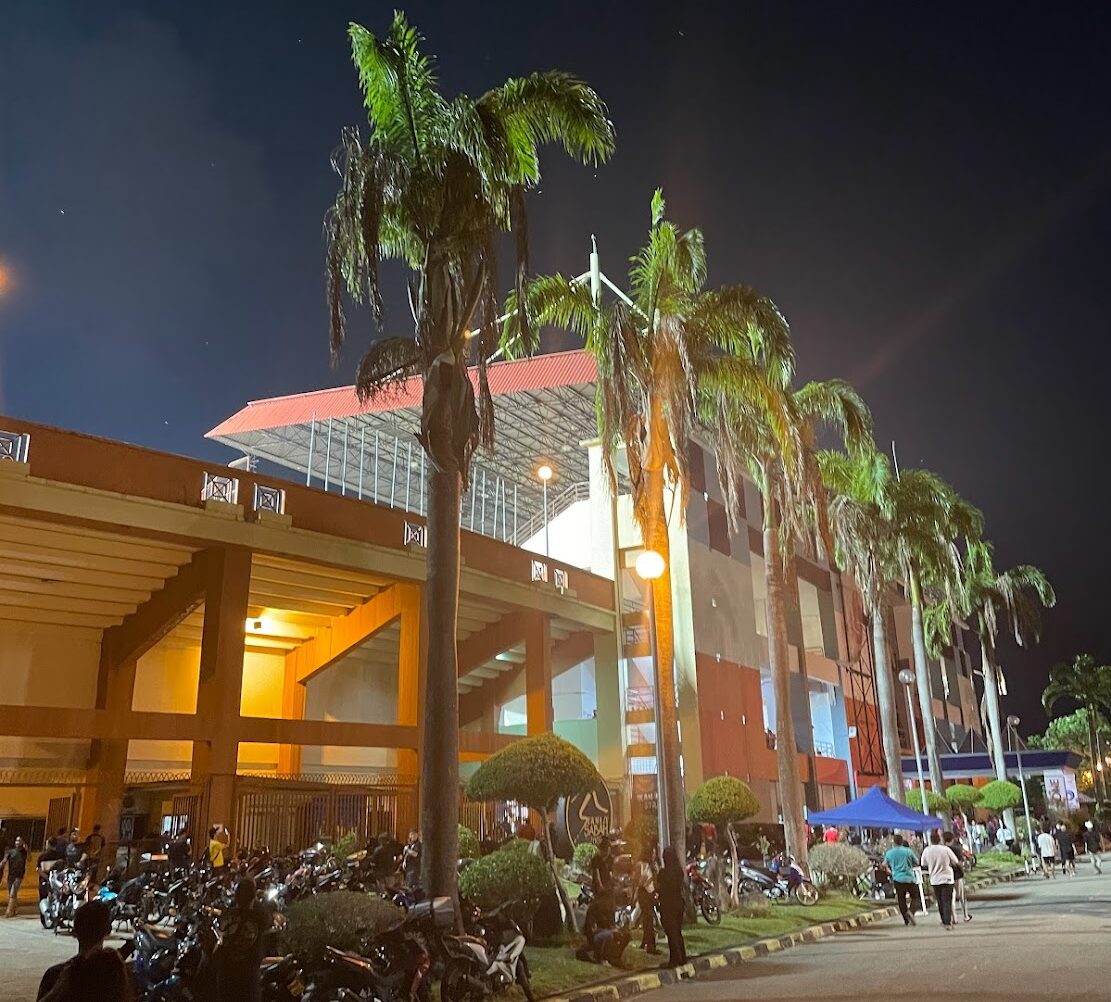When people hear about the island of Borneo, naturally their minds will jump to miles of dense jungle terrain and wildlife unimaginable to those of us who reside in urban society.
What you probably won’t expect here is top-flight soccer. Yet, on the northern coast of this idyllic and rugged island, there’s a club with a fervent fanbase, Brazilian flair electrifying the atmosphere within the stadium that harks back to European days of old, and affectionate warmth from locals who are frankly surprised to see a westerner amongst their ranks for the evening.
Let me fill you in on Sabah FC, a unique club within Malaysia for so many reasons.
Introducing the Rhinos
If you’d told me a couple of years ago that I’d have attended two Malaysian Super League games in the near future, I’d have thought something was wrong with you. However, to follow up on my recent visit to Kuala Lumpur City FC, I had to check out how different, if at all, soccer in Borneo was.
Without turning this into a geography lesson, Malaysia is split into two main regions: there’s peninsular Malaysia, where the capital and other more urbanized areas are, and then there’s eastern Malaysia on the tropical, but massive, island of Borneo. Then, within Malaysian Borneo, there are the three federal states of Sarawak, Labuan, and the one we’ll be focusing on – Sabah.
The people of Sabah, at least from my short amount of time, are very proud of their unique heritage and culture. You simply can’t lump this distinct part of Malaysia in with the other parts, there’s too much difference. One of the main stereotypes I’ve heard about Sabahans is how hospitable they are.
This was evident in the stands and streets before kickoff. There was genuine surprise among what were presumably regulars that I, clearly not a local, was attending this game. I’ve never been spoken to more by complete strangers at a sporting event.
Children approached me and said “Hi”, waving at me as they did, and locals asked “Where are you from?” with smiles on their faces. South-East Asian friendliness is heartwarming but I didn’t expect to receive it to this degree at a soccer match.
Back to soccer, I needed to inspect how Sabah was performing this season and what their prospects were. I touched on Johor Darul Ta’zim’s dominance of Malaysian soccer in my Kuala Lumpur City FC article so I won’t go into that too much here but, to put it simply, Sabah seemed to be in a battle to finish in second place – or ‘the best of the rest’.
Before kickoff, the Rhinos were in 5th position in the Malaysian Super League, four points off Selangor in 2nd. While they weren’t going to challenge JDT for the title, 2nd place in the table would mean qualification for the Asian Champions League, a much sought-after prospect for a club like Sabah.
Sabah has been the national champion on one occasion in its history: in 1996 when the league was known as Liga Perdana. That was the club’s last major title, something I’m sure they’re desperate to correct.
So far this season, it’s been Sabah’s home form that has propelled them up the league, only dropping two points at Stadium Likas all season. Speaking of which, their stadium looks the part. Situated in the largest city on the island, Kota Kinabalu, Stadium Likas has a huge grandstand, which is an impressive structure when dwarfing its neighboring stands behind the goals.
Maintaining their home ground’s fortress status for the rest of the campaign would surely result in a high finish.
Matchday vs Perak
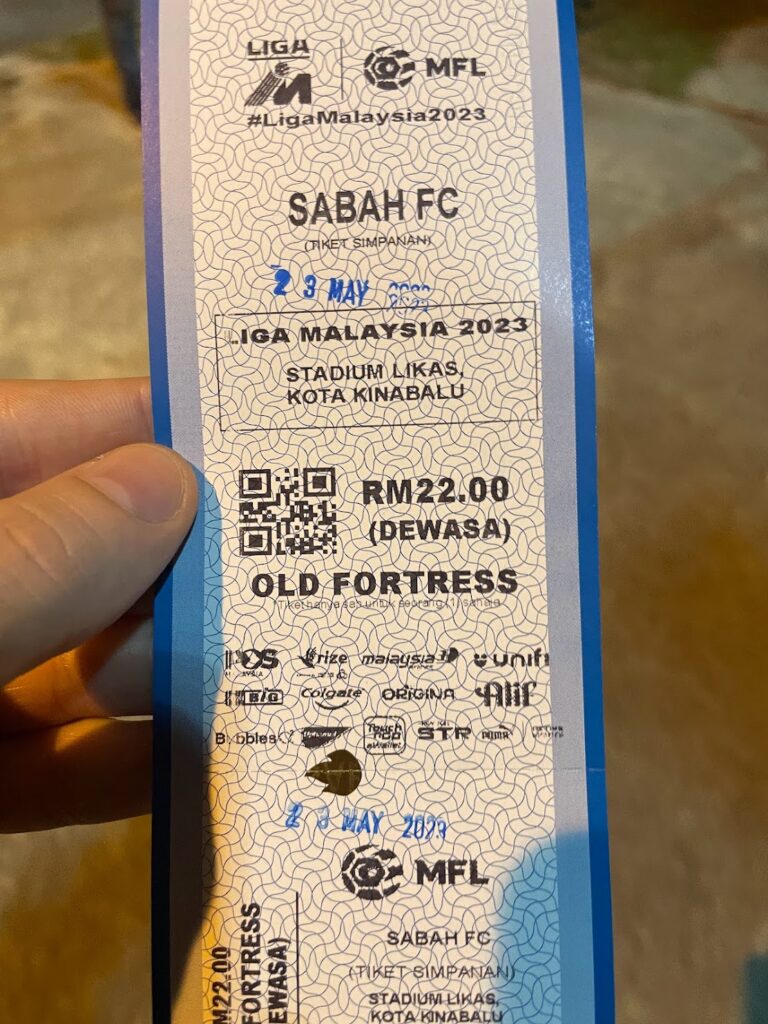
Ironically, the stand I was in for this game was called ‘The Old Fortress’. The ticket, which set me back 22 Ringgit ($4.80), was easy to purchase 15 minutes before kickoff, giving me just enough time to gaze at the floodlights and admire the partisan nature of those around me.
Vuvuzelas, an instrument I thankfully haven’t seen or heard in many years, were being sold outside the ground as well as scarves which, other than swinging them over their heads, there is no use for in Borneo.
As I took my seat on yet another extremely humid night in Kota Kinabalu, the spectators in attendance were ready to lend their vocal support as the 12th man. Whether they could be heard by the players or not was another matter; it was surprising how far away from the pitch fans were, given that it wasn’t a massive stadium. Having said that, 22,000 seats in the ground was still impressive considering the stature of the club.
Today’s opponents were Perak, a club from the city of Ipoh, another place I briefly visited when I was in peninsular Malaysia. The visitors were having a much tougher time of it this season, sitting in 11th in the standings, fourth from dead last. Did that mean this was to be a straightforward evening for Sabah?
The players were greeted by thousands of cheering supporters at a fairly well-attended Stadium Likas as they stepped onto the field. They lined up for the national anthem and we were ready to get things started.
Before many had even entered through the turnstiles, the home side found themselves a goal up. After a floated free kick wasn’t dealt with by the Perak defense, a side-footed effort came back off the post before the ball ricocheted around the visitors’ penalty area, eventually landing at the feet of Darren Lok, who controlled then volleyed home to bag his second goal in as many games to put the hosts in front.
The jubilant scenes around me were actually a little surprising – as if the Sabah fans were shocked that their immense home form was continuing. It was great to see such animation, however. Clearly, the regulars weren’t as complacent about this fixture as I might’ve been.
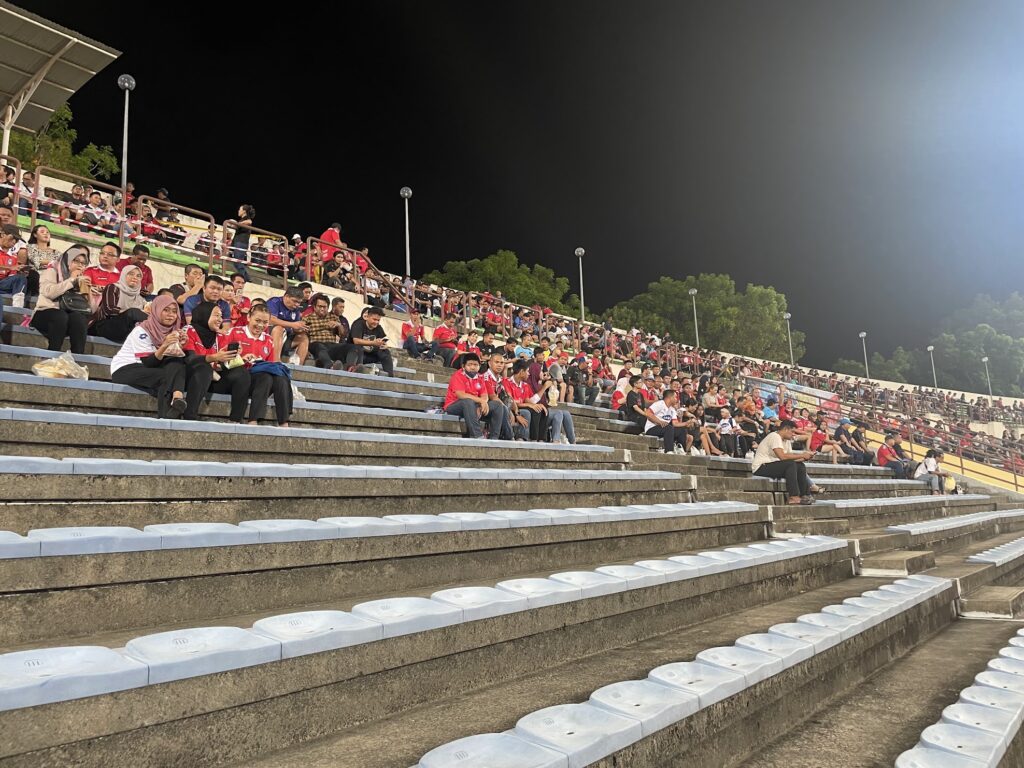
Sabah didn’t relent either. It was constant pressure from the home side from the first whistle and Perak offered nothing going forward. Truly a case of men against boys. I won’t dwell on the fact that I bear witness to one of the worst missed chances I’ve ever seen live; an open goal that should’ve been simple (spoiler: it wouldn’t matter).
Particularly enjoyable was the performance of Brazilian winger Jailton Paraiba, whose nifty footwork and speed were a thorn in Perak’s paw all evening, frequently showing off his samba skills to the delight of all in attendance.
While the finish from the second goal was of high quality, the defending was simply amateurish. I don’t expect world-class soccer everywhere I go and I’m aware that the standard that I’m watching in some parts of Asia simply can’t compete with the Premier League, but I implore you to watch in bemusement at how static the Perak defenders were when Park Tae-Su doubled the home side’s advantage. It should be a lesson to youngsters for everything not to do when defending. The goalkeeper had every right to be furious with his teammates.
The game was already over, I’d decided, so I was just hoping to perhaps be proven wrong. Any glimmer of hope was dashed when the third goal arrived 5 minutes before half-time. Genuine quality was on show here as Paraibo swung a delicious ball into the Perak area which was dutifully headed home by Baddrol Bakhtiar into the roof of the net. I’ll give Perak a break here, this goal was a tough one to defend.
The concourse and the second half
Putting the visitors out of their misery, at least temporarily for half time, felt like a charitable act from the referee. 3-0 to Sabah who had been simply blistering.
In the interval, I explored the stalls and kiosks serving food. So much on offer here, almost all of it fried but looking delicious nonetheless. Chicken, corn dogs, curries, burgers were all served up with local twists to them. When I saw roasted and salted chickpeas in a bag, I found it too obscure as soccer food to pass up. A helping of pork dim sum (bringing my food total to 8.80 Ringgit = $1.90) made this truly the most random soccer food experience of my life.
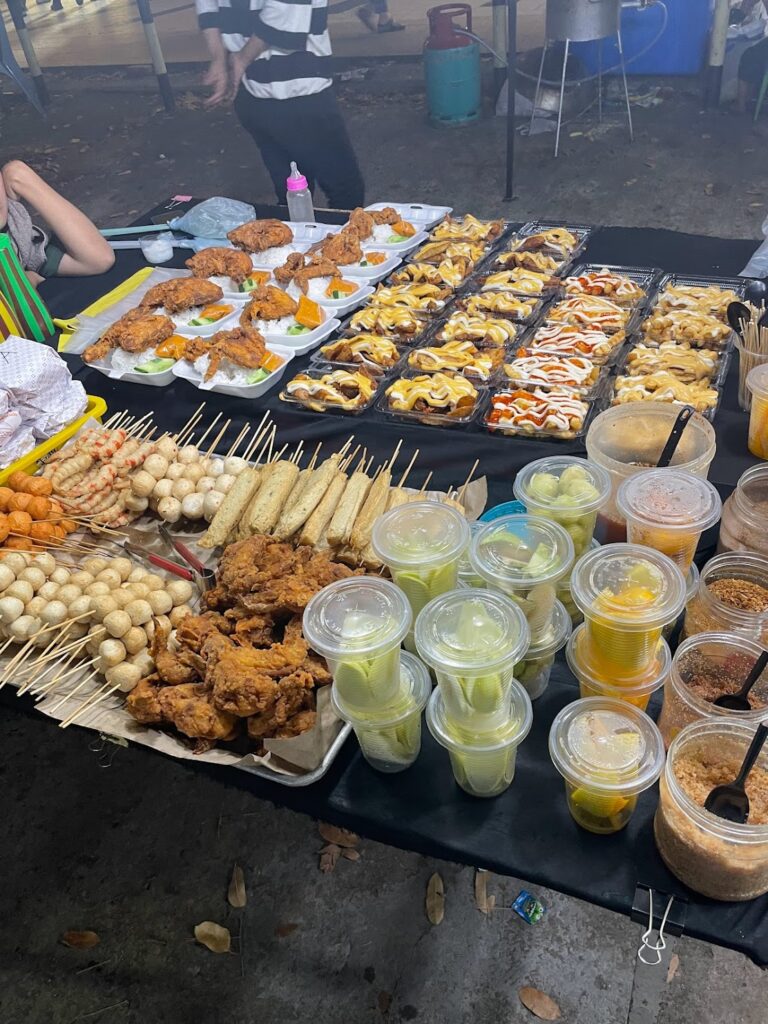
Bizarrely, there was a boxing ring outside the Old Fortress stand at half-time too with a number of children playing in it. Some of the displays were more of a fight than Perak was putting up.
The second half commenced and I expected more of the same; basically how many goals could Sabah win by?
Sadly, the home side took their foot well off the metaphorical pedal and made this half quite a dull one. It was too little too late for Perak, of course, but this at least meant there were occasional attacks at both ends of the field this time.
Those forays forward were scarce though, especially for Sabah who lacked the requisite motivation to drive up the field with any great intent.
On the hour, Perak thought they could mount a comeback when an overhit cross looked to be heading in beyond the hapless goalkeeper, only to be denied when the ball crashed against the crossbar and back out. On another night, this might have sailed in.
In truth, the second half was largely noneventful. The loudest roar from the home stands was when Jailton Paraibo, the game’s standout performer, was substituted and walked down the touchline bowing to the fans. There’s obviously a connection between him and the club.
In the 83rd minute, a consolation goal arrived, however. Catching the ‘keeper out at the near post with a fierce strike, Harith Naem cut the deficit to two and make the remainder of the game somewhat interesting.
I must commend the considerable number of traveling Perak fans too. Despite their side being thoroughly outplayed, they made themselves heard all match and it only struck me during the first half just how far they had to travel to get here – it’s over 1,000 miles between the two cities!
I stayed until the last minute because I witnessed Aston Villa come from 3-0 to draw with only 8 minutes remaining once. I was tempted to leave early that day but I’m so glad I didn’t, hence why I never leave early now.
More home comforts for Sabah
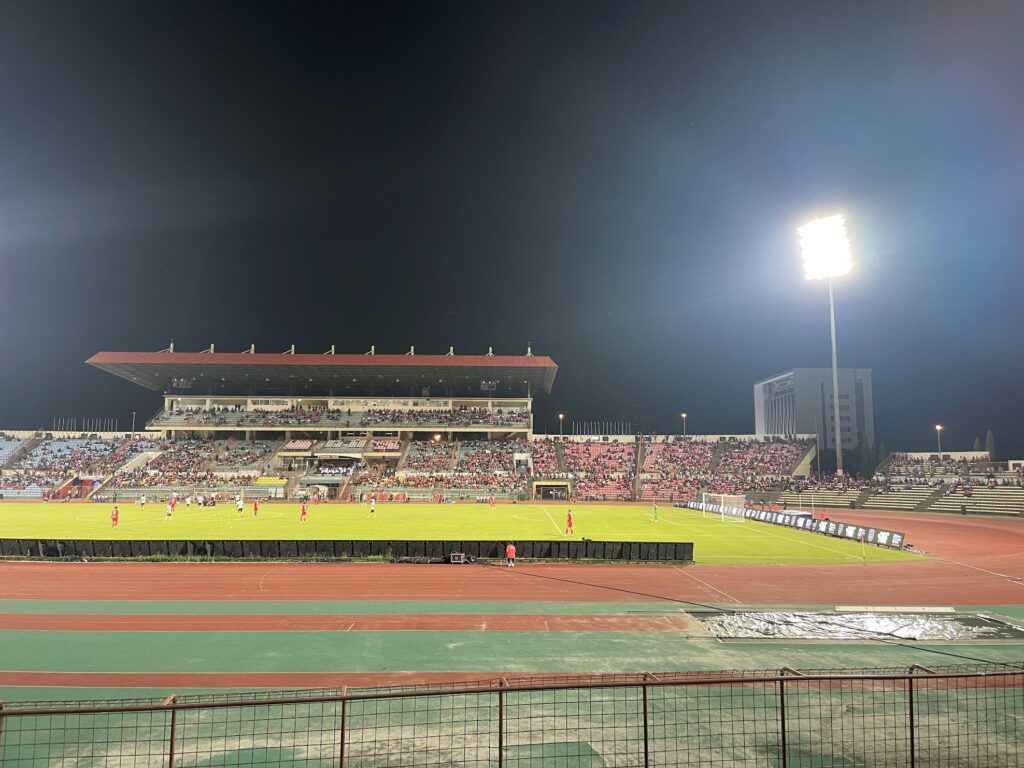
Little did I know, that Perak strike was indeed the last meaningful act of the game. Sabah couldn’t keep their clean sheet but they won’t care, their charge up the league continues, as does their sublime home form.
Although I couldn’t understand exactly what was being said among fans as everybody walked out of the stadium, it wasn’t hard to decipher that the general mood was a jovial one. It’s hard not to be so positive about things when you’re winning so much.
Getting back to Kota Kinabalu was easy and I got to meet an extremely friendly taxi driver who treated me as part of his family. This really does exemplify how courteous and friendly the people are in Sabah. They seem to radiate warmth and curiosity.
I’m hesitant to say that it’s unlikely I’ll go to a third Malaysian league match because I didn’t think I’d make it to two. This, however, felt almost like a totally different experience than Kuala Lumpur. The food, the atmosphere, the climate, and the people made this a very enjoyable evening. Oh, and I didn’t hear a single vuvuzela in the stadium either!

